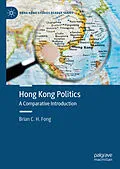"Clear-minded, conversant with the international literature, and intellectually passionate, Professor Brian Fong makes a case for the study of Hong Kong Politics within comparative contexts. Hong Kong's political existence has always been atypical, not easily susceptible to conventional theorisations. The city will continue to see twists and turns in its trajectory as a special administrative region of China. Hong Kong Politics has not come to an end as some fatalists put it. Fong's book provides an overview of an era. The next era has only just begun." - Professor Anthony B. L. Cheung, former President of the Education University of Hong Kong (2008-12).
Brian C. H. Fong is Full Professor in the College of Social Sciences at the National Sun Yat-sen University, Taiwan. His research focuses on great power competition, democratisation, and identity politics, producing more than 80 journal articles, book chapters, authored books, and so forth. He is the author of US-China Great Power Competition in the Indo-Pacific: A Tale of Two Hegemons (Edinburgh University Press, 2024) and lead editor of The Routledge Handbook of Great Power Competition (Routledge, 2024).
Autorentext
Brian C. H. Fong is Associate Director/Associate Professor of the Academy of Hong Kong Studies at the Education University of Hong Kong. Specialized in China's influence, territorial autonomies and democratization, he has published extensively in international peer-reviewed journals such as Democratization, International Review of Administrative Sciences, China Quarterly, Modern China, and Asian Survey.
Klappentext
This book aims to provide a clear, concise and accessible reader on the story of political transition of Hong Kong from the British colonial times to the Chinese SAR period in comparative politics contexts. It offers a unique integrated conceptual framework for studying Hong Kong Politics through combined center-periphery, democratization and governance perspectives, thereby helping readers to understand and interpret the various dimensions of Hong Kong Politics in a comprehensive and holistic way. Experienced researchers of Hong Kong Politics will find this book illuminating while new readers of Hong Kong Politics from different sub-fields of comparative political studies will find it a handy introductory text. This book is an excellent resource for instructors and students of Asian Studies, China Studies, Taiwan Studies and Hong Kong Studies.
Inhalt
The Introduction will set out the overall framework for the book. It will provide a concise account of the political transition of Hong Kong from British colonial time to Chinese special administrative region period, a discussion about the theoretical significance of studying Hong Kong Politics and an overview of the integrated conceptual framework for studying Hong Kong Politics.
Part I of the book will cover three individual chapters on discussion of Hong Kong Politics in center-periphery perspective. Chapter 1 will examine the process of "de-centralization" that Hong Kong had undergone under the final decades of British sovereignty with special reference to the informal devolution of autonomous powers from Britain from 1950s to 1970s and the codification of such autonomous powers under Sino-British Joint Declaration and Basic Law in the 1980s; Chapter 2 will examine the process of "centralization" that Hong Kong has undergone in recent years under Chinese sovereignty with special reference to the clash of Beijing's state-building nationalism and Hong Kong's peripheral nationalism; Chapter 3 will examine the evolution of Hongkongese identity as an emerging case of stateless nation with special reference to its birth and consolidation under British sovereignty and its re-imagination under Chinese sovereignty.
Part II of the book will cover three individual chapters on discussion of Hong Kong Politics in democratization perspective. Chapter 4 will examine the process of "de-authoritarianization" that Hong Kong had undergone under the final decades of British sovereignty with special reference to the democratic reforms introduced under transitional period; Chapter 5 will examine the process of "re-authoritarianization" that Hong Kong has undergone in recent years under Chinese sovereignty with special reference to the growing trend of electoral authoritarian-style manipulations; Chapter 6 will examine the evolution of Hong Kong democratic opposition in comparative contexts with special reference to its birth and consolidation under British sovereignty and its fragmentation under Chinese sovereignty.
Part III of the book will cover two individual chapters on discussion of Hong Kong Politics in governance perspective. Chapter 7 will examine the process of "governization" that Hong Kong had undergone under British sovereignty with special reference to the formation and evolution of the colonial governing coalition; Chapter 8 will examine the process of "de-governization" that Hong Kong has undergone in recent years under Chinese sovereignty with special reference to the successes and failures of the post-colonial governing coalition.
The Conclusion of the book will discuss the political future of Hong Kong in comparative politics perspective and the Research Guide will introduce major archives, databases and stakeholder organizations for studying Hong Kong Politics.
